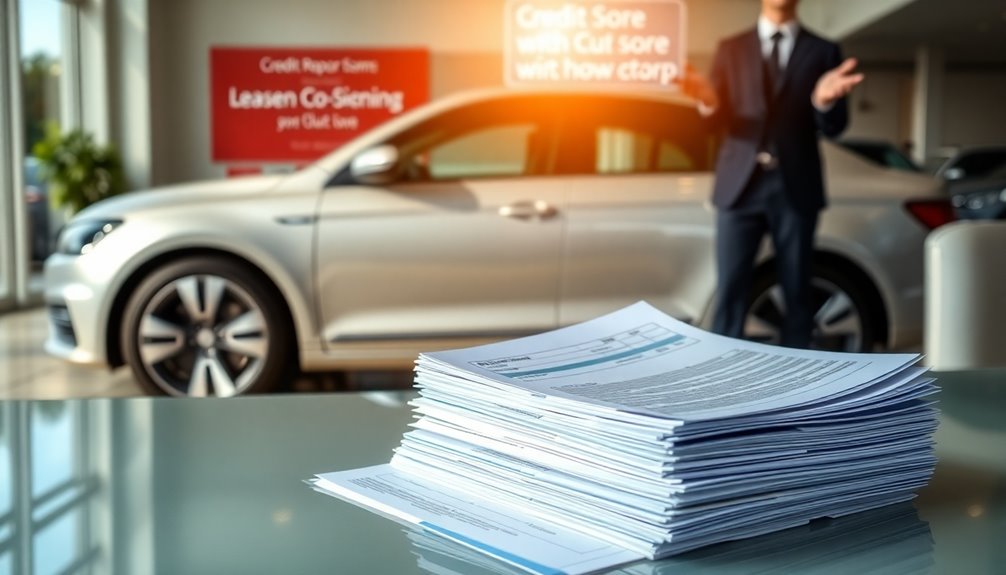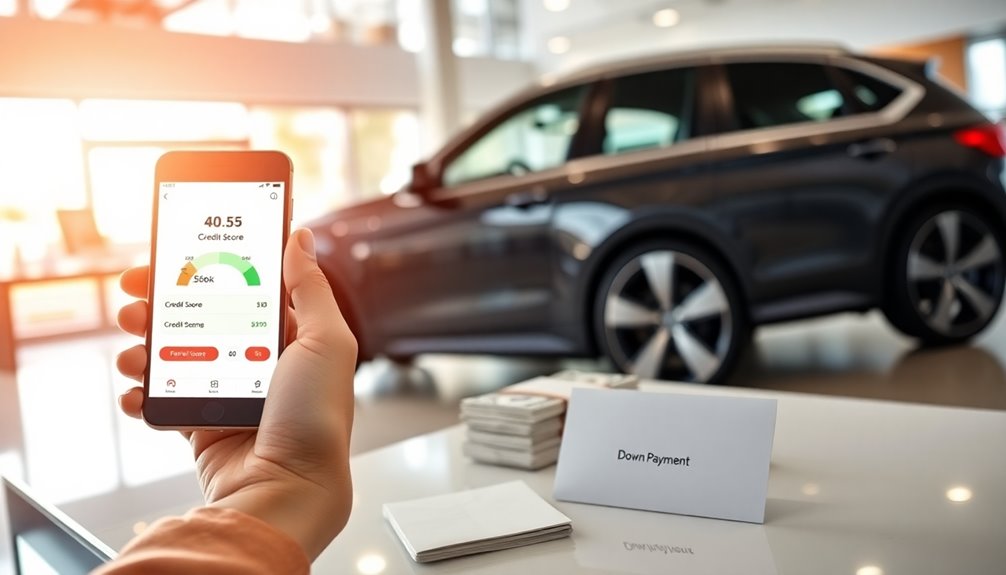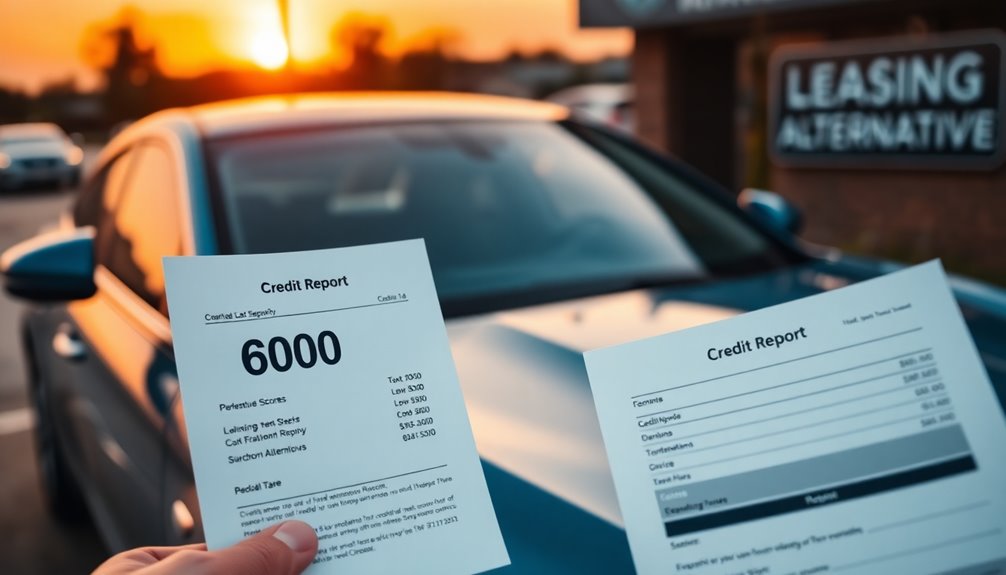To lease a car without a co-signer, you'll need a minimum credit score of around 620. Scores above 680 can give you better terms and options. If your score is between 620 and 679, you might face higher monthly payments and fewer choices. Scores below 620 can greatly limit your leasing opportunities, often requiring a co-signer or only allowing you to lease lower-priced models. Showing proof of stable income and possibly making a larger down payment can improve your chances, too. There are more insights to explore that can help strengthen your leasing position.
Key Takeaways
- A minimum credit score of 620 is typically required to lease a car without a co-signer.
- Scores between 620-679 are considered near ideal for leasing options.
- Scores above 700 generally lead to favorable lease terms and lower down payments.
- Approval chances decrease significantly below a score of 660, with only a 22% acceptance rate.
- Higher credit scores can result in better monthly payments and broader vehicle choices.
Understanding Credit Scores
Understanding your credit score is vital when considering leasing a car. Your credit score typically ranges from 300 to 850, and it directly impacts your leasing options. Most leasing companies require a minimum credit score of around 620 for approval.
If your score exceeds 700, you're in a better position to secure favorable terms on your lease agreement. Scores between 680 and 739 are ideal, often leading to better offers and lower interest rates.
If you find yourself with a score below 660, don't lose hope—there's still a 22% chance of acceptance. However, you might face higher payments and less favorable lease terms due to poor credit.
To improve your chances, it's important to maintain good credit by checking your credit score regularly and reviewing your credit report for errors. Timely bill payments also play a significant role in building a solid credit history.
Minimum Requirements for Leasing

When leasing a car, meeting certain minimum requirements is essential to securing a good deal. Generally, you'll need a credit score of at least 620 to lease a car without a co-signer; however, some dealerships might consider scores slightly lower. If your credit score falls between 620 and 679, you're often seen as near ideal for leasing, while scores above 680 typically reveal the best offers available.
Leasing companies usually evaluate your FICO® Auto Score, which can differ from standard credit scores, so keep that in mind. If your credit score is below 660, your chances of approval for leasing drop considerably, with only about a 22% likelihood of acceptance.
But remember, a credit score isn't the only thing leasing companies look at. Your overall financial health also plays a vital role. They'll consider your income evidence, employment history, and existing debt obligations when reviewing your application.
Impact of Low Credit Scores

Having a low credit score can greatly hinder your ability to lease a car, often limiting your options and increasing costs. Typically, a minimum credit score of around 620 is required to lease without a co-signer. If your score is below this, you may struggle with approval.
Here's how low credit affects your leasing experience:
| Credit Score Range | Leasing Options | Monthly Payment Impact |
|---|---|---|
| Below 620 | Limited to used cars or lower-priced models | Higher rates, possible denial |
| 620 – 680 | Fewer choices, potentially less favorable terms | $10 to $125 more than higher scores |
| Above 680 | Broad options with better terms | More competitive monthly payments |
Scores below 660 can considerably reduce your chances of approval, as dealerships often prioritize applicants with better financial reliability. This negative impact means you'll likely face larger down payments and higher monthly payments compared to those with better credit scores. Ultimately, a low credit score can severely restrict your leasing options, making the process more challenging and costly.
Strategies to Improve Credit

Improving your credit score is essential for expanding your leasing options and securing better terms. Start with your payment history, which accounts for about 35% of your FICO score. Make sure to pay all your bills on time, as this can greatly enhance your credit profile.
Next, focus on your credit card balances. Aim to keep them below 30% of your total credit limit to improve your credit utilization ratio quickly.
You should also keep old credit accounts open, even if they're not in use, to lengthen your credit history. This can be a simple way to boost your credit score.
Regularly check your credit report for errors—about 1 in 5 consumers find inaccuracies that can hurt their scores. Disputing these errors can lead to a quick improvement.
If you're looking to build credit or rebuild your credit profile, consider utilizing secured credit cards responsibly. They allow you to make purchases while limiting your risk exposure.
Financial Stability and Documentation

When leasing a car, proving your income stability is key to securing approval.
You'll need to gather financial documentation like recent pay stubs and tax returns to demonstrate your ability to make consistent payments.
This proof not only helps with your application but also reflects your overall financial responsibility.
Proof of Income Stability
Demonstrating proof of income stability is essential for securing a car lease, particularly if you're applying without a co-signer. Lenders want to see evidence of consistent income to guarantee you can manage monthly lease payments. This proof of income typically includes recent pay stubs and bank statements, which are vital for lease approval.
Your stable employment history plays a key role in showcasing your financial stability. A reliable job indicates that you're likely to continue earning an income, making you a more appealing candidate for leasing decisions.
If you have previous lease payment history, providing this documentation can further strengthen your application. It reflects responsible financial behavior and reassures lenders of your commitment to making payments on time.
Additionally, if you have a mortgage history, that could positively influence your leasing prospects. It signals a long-term commitment to regular payments, which can enhance your credit score and overall application.
Required Financial Documentation
Securing a car lease requires more than just proof of income stability; you'll also need to provide a variety of financial documentation to support your application. This documentation is essential for the leasing company to assess your financial reliability.
First, you'll need proof of consistent income, which typically includes recent pay stubs. These documents demonstrate your ability to make monthly lease payments.
In addition to pay stubs, prepare to provide bank statements and tax returns that reflect your financial health. Employment verification is also important, confirming your job status and income level.
A strong credit history will further bolster your application, as it showcases your past financial behavior and credit score. Some dealerships may request references or previous lease payment history to gauge your reliability.
If you can, offering a larger down payment can enhance your application, signaling your financial commitment and stability. Collecting all this financial documentation won't only streamline the leasing process but also improve your chances of securing the lease you want.
Vehicle Options for Low Credit

Finding suitable vehicle options can be challenging for individuals with low credit scores, typically below 620. However, there are still leasing options available. Some leasing companies specialize in working with applicants who've poor credit, providing access to a limited but viable selection of vehicles.
You might want to take into account used vehicles, as dealerships often offer them at lower price points and with flexible leasing arrangements for diverse credit ratings. Targeting less desirable vehicles or older car models can also increase your chances of securing a lease. These options mightn't be the latest models, but they can still serve your transportation needs effectively.
Timing your search around year-end model releases can create additional opportunities for better leasing deals. Dealerships are often keen to offload older inventory, which can lead to favorable leasing terms for you.
The Role of Down Payments

When you're leasing a car, a larger down payment can really boost your chances of approval, especially if your credit score isn't the best.
Putting down 20% or more can show leasing companies that you're serious and financially stable, which may lead to better lease terms.
Impact on Approval Chances
A substantial down payment can greatly enhance your chances of leasing a car, especially if your credit score is on the lower side. Leasing companies often view a larger down payment as a sign of financial stability, reducing their perceived risk. This means that if you've got a credit score below 680, a solid down payment can offset the effects of a poor credit history, leading to more favorable lease terms.
Here's a quick breakdown of how down payments can affect lease approval:
| Credit Score Range | Down Payment Required | Monthly Payment Impact |
|---|---|---|
| Below 680 | Higher down payment | Lower monthly payments |
| 680 – 700 | Moderate down payment | Moderate monthly payments |
| Above 700 | Minimal down payment | Higher monthly payments |
If you're working to improve your lease approval chances, consider putting down a larger sum. Not only can this lower your monthly payments, but it may also improve the overall deal you get from the dealership. Remember, better lease terms can be within reach with the right approach, as credit scores play a critical role in the leasing process.
Size and Financial Stability
Securing a lease often hinges on the size of your down payment, which plays a significant role in demonstrating your financial stability. If you have a poor credit score (below 680), expect to make a down payment of at least 20% of the vehicle's value to improve your leasing odds. A larger down payment reduces the financial risk for the dealership, making you a more attractive candidate.
Additionally, the size of your down payment can directly affect your monthly payments. By putting down more upfront, you often lower your monthly obligations, making the lease more manageable.
For those with good credit (700 and above), zero down-payment options may be available, but for individuals with lower credit scores, a substantial down payment is essential.
Leasing Alternatives for Bad Credit

Many people with bad credit feel discouraged about leasing a car, but there are several alternatives worth considering. One option is lease transfers, which allow you to take over someone else's lease through services like SwapALease. This can provide you with better terms than starting a new lease. Additionally, it's crucial to ensure that any lease agreement complies with IRS regulations to avoid future complications. Merchant services can also facilitate smoother transactions if you decide to purchase a vehicle instead of leasing. Investing in precious metals could also be a wise strategy to enhance your financial stability for future purchases. Furthermore, seeking financial counseling during this process can help you make informed decisions about your leasing options.
If leasing doesn't seem feasible, buying a used vehicle can be a smart move; it often comes with better financing options and lower overall costs compared to new car leases.
You might also explore in-house financing from buy-here-pay-here dealerships, though be cautious of the higher interest rates and limited selections. Alternatively, credit unions or community banks offer more flexible loan options, even for those with poor credit histories. Additionally, it's important to establish clear savings goals as you work on improving your financial situation to enhance your creditworthiness.
While you work on improving your credit scores, utilizing public transportation or rideshare services can be a temporary solution. By considering these leasing alternatives for bad credit, you can find a way to get on the road without feeling trapped by your credit situation.
Building Credit Through Leasing

Leasing a car can be a smart strategy for building your credit. When you make timely lease payments, you contribute positively to your credit history, which can boost your credit score. Aiming for a credit score of at least 700 increases your chances of securing a lease without a co-signer, as most dealerships prefer this threshold for favorable terms.
Here are some key benefits of leasing a car for your credit:
- Timely lease payments help establish a track record of financial responsibility.
- Credit mix diversification from leasing can enhance your overall credit score.
- Monitoring your credit report for errors guarantees your credit history remains accurate and positive.
- Improving your credit score may lead to better financing options for future purchases.
- Additionally, maintaining a strong credit profile can provide advantages in other financial areas, such as maximizing IRA contributions and securing better interest rates on loans.
Tips for Successful Leasing

When it comes to successfully leasing a car, understanding your financial position is essential. First, know that a credit score of at least 620 is typically required to lease a vehicle without a co-signer.
If you have bad credit, don't worry—taking steps to improve your overall credit can help. Regularly check your credit reports for errors and fix any discrepancies to boost your score.
Additionally, maintaining proof of income, such as pay stubs, can enhance your leasing prospects, even with a lower credit score.
Don't underestimate the power of a larger down payment; it can greatly improve your chances of securing a lease and may lead to better terms.
Research and target dealerships that specialize in leasing to individuals with less-than-perfect credit. These leasing companies often have more flexible options tailored to your situation. Moreover, understanding the concept of residual value can help you negotiate better lease terms and evaluate the overall cost of leasing effectively.
Frequently Asked Questions
What Is the Lowest Credit Score to Lease a Car?
The lowest credit score to lease a car typically hovers around 620. If your score falls within this range, you might still secure a lease but expect higher payments and less favorable terms.
Scores between 620 and 679 are generally better for leasing options, while those above 680 will likely grant you the best offers.
Can I Lease a Car With a 600 Credit Score?
You can lease a car with a 600 credit score, but it might be tricky.
Most dealerships prefer scores above 620, so you may face higher interest rates and larger down payments. Expect limited vehicle options, often older or less desirable models.
To improve your chances, show proof of steady income and consider making a bigger down payment. Look for leasing companies that specialize in working with applicants who've lower credit scores.
What Is the Minimum Credit Score to Buy a Car Without a Cosigner?
If you're looking to buy a car without a cosigner, you'll generally need a minimum credit score of around 620.
Scoring between 620 and 679 can help you secure better financing options, while a score of 700 or above is ideal for lower interest rates.
If your score dips below 620, you might face higher rates or limited financing choices, making your car-buying journey a bit tougher.
How Much Is a Lease on a Car?
Leasing a $45,000 car typically costs you between $450 and $600 per month.
This amount varies based on the lease term, interest rates, and the car's residual value at the end of the lease.
Keep in mind that a larger down payment can lower your monthly payments by $50 to $100.
Also, watch out for additional costs like taxes, registration fees, and maintenance, as these can impact your overall leasing expenses.
Conclusion
To sum up, while leasing a car without a co-signer typically requires a credit score of 680 or higher, it's not impossible with lower scores. For instance, consider Sarah, who had a score of 650. By saving for a larger down payment and showing stable income, she secured a lease. This not only got her the car she wanted but also helped boost her credit score over time. So, take the right steps, and you can achieve your leasing goals!










